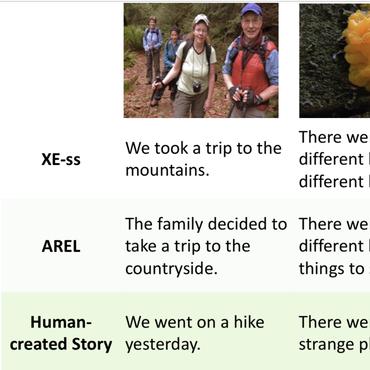Story Generation
74 papers with code • 5 benchmarks • 6 datasets
Story generation is the task of automatically generating a coherent narrative, often from a set of premises or a brief summary.
Most implemented papers
Hierarchical Neural Story Generation
We explore story generation: creative systems that can build coherent and fluent passages of text about a topic.
A Temporal Variational Model for Story Generation
Recent language models can generate interesting and grammatically correct text in story generation but often lack plot development and long-term coherence.
Locally Typical Sampling
Automatic and human evaluations show that, in comparison to nucleus and top-k sampling, locally typical sampling offers competitive performance (in both abstractive summarization and story generation) in terms of quality while consistently reducing degenerate repetitions.
GLAC Net: GLocal Attention Cascading Networks for Multi-image Cued Story Generation
The task of multi-image cued story generation, such as visual storytelling dataset (VIST) challenge, is to compose multiple coherent sentences from a given sequence of images.
Plan-And-Write: Towards Better Automatic Storytelling
Automatic storytelling is challenging since it requires generating long, coherent natural language to describes a sensible sequence of events.
PlotMachines: Outline-Conditioned Generation with Dynamic Plot State Tracking
We propose the task of outline-conditioned story generation: given an outline as a set of phrases that describe key characters and events to appear in a story, the task is to generate a coherent narrative that is consistent with the provided outline.
On Faithfulness and Factuality in Abstractive Summarization
It is well known that the standard likelihood training and approximate decoding objectives in neural text generation models lead to less human-like responses for open-ended tasks such as language modeling and story generation.
Transformer-based Conditional Variational Autoencoder for Controllable Story Generation
In this paper, we advocate to revive latent variable modeling, essentially the power of representation learning, in the era of Transformers to enhance controllability without hurting state-of-the-art generation effectiveness.
Of Human Criteria and Automatic Metrics: A Benchmark of the Evaluation of Story Generation
However, there is no consensus on which human evaluation criteria to use, and no analysis of how well automatic criteria correlate with them.
Event Representations for Automated Story Generation with Deep Neural Nets
We then present a technique for automated story generation whereby we decompose the problem into the generation of successive events (event2event) and the generation of natural language sentences from events (event2sentence).





 WritingPrompts
WritingPrompts
 TVRecap
TVRecap


